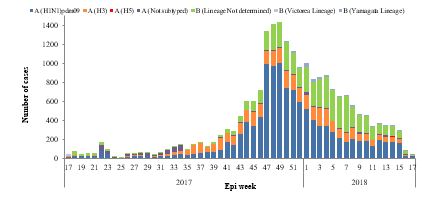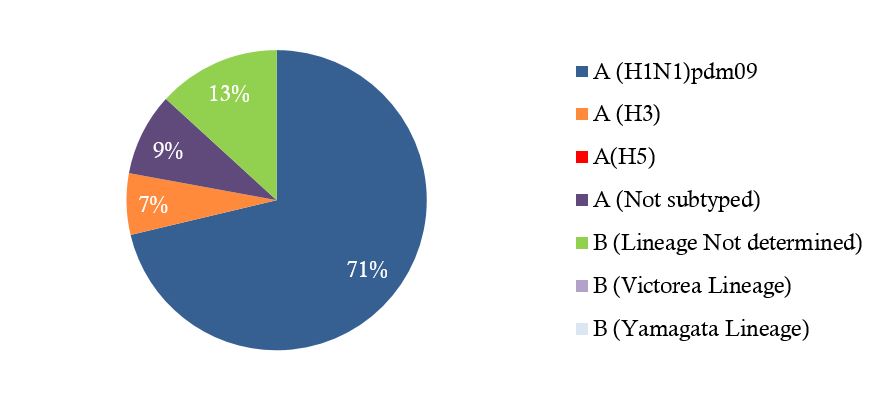In the WHO Eastern Mediterranean Region, influenza activities continue to decrease during the month of February in many countries reporting data to FluNet and EMFLU namely, Afghanistan, Bahrain, Egypt, Islamic Republic of Iran, Iraq, Jordan, Kuwait, Lebanon, Morocco, occupied Palestinian territory, Oman, Pakistan, Qatar, Saudi Arabia and Tunisia (Fig. 1).
Fig.1. Influenza geographic spread in Eastern Mediterranean Region, February 2018
Influenza activity by sub-type
- In February 2018, no new cases of human influenza A(H5N1) were reported in Egypt.
- In the northern Africa influenza transmission zone, Morocco and Egypt reported co-circulation of both influenza A(H1N1)pdm09, A(H3N2) and influenza B while Tunisia reported circulation of influenza A virus.
- In the Western Asia influenza transmission zone, influenza A(H1N1)pdm09 were detected predominantly with Influenza A (H3N2) and influenza B virus in Kuwait, Iraq, Oman, Qatar and KSA while Bahrain, Jordan and oPt reported co- circulation of influenza A(H1N1)pdm09 with influenza B virus.
In southern Asia transmission zone, Afghanistan, Islamic Republic of Iran and Pakistan reported co-circulation of all seasonal influenza viruses.
Fig.2 shows the weekly distribution of influenza subtypes.

Fig. 2. Weekly positive cases of influenza by subtype, Epi week 8/2017–2018
Circulating influenza viruses by subtype
During February 2018, regional national influenza centres and influenza laboratories tested a total of 11 555 specimens for influenza viruses of which 2514 (21.7%) tested positive.
The average percentage of positivity rates is 22%, with highest positivity rate recorded in Bahrain, Egypt, Kuwait, Morocco and Tunisia.
Of the influenza viruses tested, 1232 (49%) were influenza A viruses, including 810 (32%) influenza A(H1N1)pdm09 viruses and 382 (15%) were influenza A(H3) viruses; 1282 (51%) were influenza B viruses, including 49% Lineage not determined and 2% B (Yamagata Lineage) (Fig. 3).










